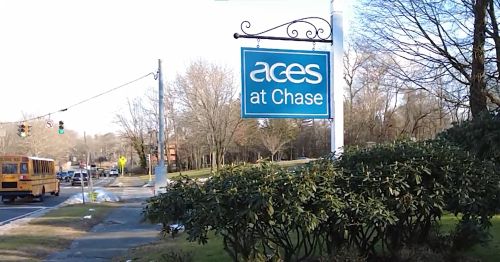-
Our Agency
- About Us
- Calendars
- Contact Us
-
Directions
- ACCESS
- ACES at Chase
- ACES International Preschool and Childcare Center
- ACES Transportation Services
- Center for Autism Spectrum and Developmental Disorders
- Central Office
- Educational Center for the Arts
- Educational Technology
- Little Theatre on Lincoln Street
- Mill Road School
- Network Services
- Staff Development / Administration
- Village School
- Whitney High School North
- Wintergreen Interdistrict Magnet School
- Human Capital Development
- Education Foundation
- News / Press
- Publications
- Request for Proposals
- Employment
- Events & Workshops
- Referrals
-
Schools & Programs
-
Special Education Schools
- Center for Autism Spectrum and Developmental Disorders
- Mead Elementary School
- Mill Road School
- Village School
- Whitney Academy EXPLORE & CREATE
- Whitney High School North
-
Magnet Schools
-
ACES Chase Academy
- About Us
- ACES Chase Academy: History & Origins
- Admissions
-
Student and Family Portal
- Breakfast and Lunch Menus
- Cancellations, Delays, and Early Dismissal
- Community Health Center
- Dress Guidelines
- Family Teacher Organization (FTO)
- Health Office
- Principal's Corner
- Monitoring Grades: PowerSchool Parent Portal
- Quick Links
- Student Handbook
- Athletics Handbook
- Summer Reading and Math
- Technology & Digital Citizenship
- Virtual Suggestion Box
- Document Library
- Contact Us
- Back to ACES
- Educational Center for the Arts
- Wintergreen Interdistrict Magnet School
-
ACES Chase Academy
- Alternative Education
- ACES Early Head Start
- ACES International
-
ACES International Preschool and Childcare Center
- About Us
- ACES International Preschool and Childcare Center Donations
- Admission Interest
- Meet the Staff - Newtown Center
- Meet the Staff - Woodbury Center
- Calendar
- Contact Us - Newtown Center
- Contact Us - Woodbury Center
- Family Portal
- Enroll Now: ACES International Preschool and Childcare Center Newtown Location
- Back to ACES
- ACES Open Choice
- Family and Community Engagement
- Magnet School Parent Choice
- School-Based Services
-
Special Education Schools
-
Services
- ACCESS Adult Vocational Services
- ACES Insurance Collaborative
- ACES UP Renewable Energy Solutions
- Alternate Routes to Certification
- Business Partnership Opportunities
- Center for Safe Schools
- Clinical Services
- Educational Technology
- Facility Rental
- Fingerprinting
- International Programming
- Marketing and Communications Services
- Network Services
- Professional Learning
- Regional Education Councils
- Regional Special Education Transportation
- Speech and Language Services
- Transportation
- World Language Translation Services
- Find
Table of Contents
6111 School Calendar
6112 School Day
6112.1 Opening Exercises, Observances, Ceremonies, Programs
6121 Nondiscrimination in the Instructional Program
6141.321 Acceptable Computer Network Use (AUP)
6142 Basic Instructional Program
6142.101 Student Nutrition and Physical Activity (School Wellness Policy)
6161 Equipment, Books, and Materials: Provision/Selection
6162.7 Copyrighted Computer Software
6164.12 Acquired Immune Deficiency Syndrome (AIDS)
6164.12.1 Instruction Concerning AIDS
6164.12.2 Exemption from Instruction Concerning AIDS
6200 Adult/Continuing Education
The school calendar shall show the beginning and ending dates of school, legal and local holidays, meeting days, number of teaching days, vacation periods, and other pertinent dates.
The Board of Education may operate schools on state holidays providing a suitable nonsectarian educational program is held to observe the holiday, except for those holidays that occur in December and January.
The Superintendent shall recommend to the Board of Education a school calendar that will meet the requirements of the law as well as the needs of the community, students, and personnel.
The Board of Education may declare a holiday in the schools under its jurisdiction when good reason exists.
Note: A Board of Education for a school that has been designated as a low achieving school pursuant to subdivision (1) of subsection (c) of C.G.S. 10-223e may increase the number of actual school sessions during each year, and may increase the number of hours of actual school work per session in order to improve student performance and remove the school from the list of schools designated as a low achieving school maintained by the State Board of Education.
For the school year commencing July 1, 2014, and July 1, 2015, the Board of Education may adopt the RESC approved uniform regional school calendar.
For the school year commencing July 1, 2016, and each school year thereafter, the Board of Education shall use the RESC developed and approved uniform regional school calendar.
The Board of Education may delay implementation of the uniform regional school calendar until the school year commencing July 1, 2017 because of an existing employee contract that makes the implementation of such calendar impossible.
Legal Reference: Connecticut General Statutes
1-4 Days designated as legal holidays.
10-15 Towns to maintain schools, as amended by PA 11-85, An Act Concerning the Achievement Gap.
10-29a Certain days to be proclaimed by governor. Distribution and number of proclamations.
10-261 Definitions.
10-16l Establishment of graduation date.
10-233j Student possession and use of telecommunication devices.
PA 13-247 An Act Implementing Provisions of the State Budget for the Biennium Ending June 30, 2015 Concerning General Government, Sections 321-324.
PA 14-38 An Act Concerning the Recommendations of the Uniform Regional School Calendar Task Force.
Policy adopted: December 11, 2014
Grades K-12
The ACES Executive Director shall ensure that:
- The school year provides at least 180 days of school for all grades;
- The school year provides a minimum of 900 hours of actual school work (450 hours for half-day kindergarten). In meeting this requirement, no more than seven (7) hours of actual school work on a given day shall be credited toward meeting the 900 hour minimum;
- In an early school closing or delayed opening because of weather, the district will provide a minimum of 900 hours of actual school work (450 hours for half-day kindergarten) by the conclusion of the school year.
- Should it be necessary to consider alternative scheduling in any single school year, because of unusual circumstances which could interfere with fulfilling the 180 day school year requirement, the Executive Director shall recommend to the ACES Governing Board a plan for alternative scheduling to be transmitted to the State Board of Education for its consideration and possible approval.
Legal Reference: Connecticut General Statutes
Sec. 10-15 Towns to maintain schools;
Sec. 10-16 Length of school year.
Policy adopted: October 9, 2003.
6112.1 Opening Exercises, Observances, Ceremonies, Programs
Each schoolroom operated by ACES shall be furnished with and will display a United States Flag. Each school building will be provided with a flag for exterior display. Each homeroom and elementary class shall conduct opening exercises each school day including the salute to the flag, the reading of announcements and notices and the opportunity to observe such time in silent meditation for those students and staff who wish to do so.
In observances of legal, State and National holidays, recognition may be made as appropriate to the historical and cultural value of such holidays.
Ceremonial events shall be conducted as appropriate to the occasion, with sensitivity and respect toward students whose cultural backgrounds may differ from that of the event being observed. School programs are valuable components of the total education program, and teachers shall be free to use music, literature, drama, poetry, art, and dance, with origins in any faith, based upon the artistic merit and/or performance suitability of the available material and the interests and capabilities of the teachers and students producing the program. Similar academic criteria shall apply to any aspect of the curriculum.
Students and teachers shall have the right to refuse, for reasons of conscience, to participate in or attend any activity or program which includes material which they may deem contrary to personal beliefs.
Legal Reference: Connecticut General Statutes
10-16a Silent Meditation;
Sec. 10-230 Flags for schoolrooms and schools.
Policy adopted: October 9, 2003.
6121 Nondiscrimination in the Instructional Program
ACES pledges to avoid discriminatory actions and seeks to foster good human and educational relations which will help to attain:
- equal right and opportunities for students and staff members in the school community.
- equal opportunity for all students to participate in the total school program of the schools.
- continual study and development of curricula toward improving human relations and understanding and appreciating cultural differences.
- training opportunities for improving staff ability and responsiveness to educational and social needs.
- opportunities in educational programs which are broadly available to all students.
- an appropriate learning environment for students which includes (1) adequate instructional books, supplies, materials, equipment, staffing, facilities and technology, (2) equitable allocation of resources among district schools and (3) a safe school setting. Each student, at the time s/he becomes eligible for participation, will be advised of his/her right to an equal opportunity to participate in school programs without discrimination of any kind.
Pursuant to the Americans with Disabilities Act (ADA) and Section 504 of the Rehabilitation Act of 1973, no otherwise qualified individual with handicaps shall, solely by reason of such handicap, be excluded from participation in, be denied the benefits of, or be subjected to discrimination under any program of the ACES Governing Board.
The right of a student to participate fully in classroom instruction and extracurricular activities shall not be abridged or impaired because of age, sex, sexual orientation, race, religion, national origin, pregnancy, parenthood, marriage, or for any reason not related to his/her individual capabilities.
Legal Reference: Connecticut General Statutes
Sec. 10-15 Towns to maintain schools;
Sec. 10-15c Discrimination in public school prohibited;
Title IX of the Education Amendments of 1972,
20 U.S.C., 1681 et seq.;
Section 504, U.S. Rehabilitation Act, 1973,
29 U.S.C. 791.
Policy adopted: October 9, 2003.
6141.321 Acceptable Computer Network Use (AUP)
It is the policy of Area Cooperative Educational Services (ACES) that network technology services are to be used in a responsible, efficient, ethical and legal manner in accordance with the mission and policies of ACES. Users of network technology services must acknowledge their understanding of the general policy and guidelines as a condition of using the network. Use of network technology services is a privilege, not a right. Failure to adhere to the policy and administrative procedures may result in suspension or revocation of network access. Willful or intentional misuse could lead to disciplinary action, including suspension or termination, or criminal penalties under applicable state and federal law.
Access to the Internet is provided by Area Cooperative Educational Services for the purpose of benefiting the school community, the educational and business responsibilities of ACES, and enriching the educational experience for all students. In order to better facilitate the safe use of the Internet by students at ACES, technological measures will be taken to attempt to restrict access by minors to materials that may be harmful to minors and incompatible with the educational mission of ACES, as well as to promote the internal security of the network. ACES takes appropriate measures to educate minors about appropriate online behavior, including interacting with other individuals on social networking websites and in chat rooms and cyber bullying awareness and response.
All student users must read and sign the Acceptable Use Agreement prior to being permitted to access the Internet through the network provided by ACES. All staff are expected to be familiar and comply with the ACES Acceptable Use Policy.
The Executive Director or his/her designee shall be responsible for overseeing the implementation of this policy and the accompanying rules. The Executive Director or his/her designee may develop additional administrative procedures/rules governing the day-to-day management and operations of the computer system as long as they are consistent with this policy.
Policy adopted: December 11, 2008
Curriculum
6142 Basic Instructional Program
All ACES programs providing the full-time educational program for elementary and secondary school students shall offer a program of instruction, taught by legally qualified teachers, that shall include: The arts; career education; consumer education; health and safety; including, but not limited to, human growth and development, nutrition, first aid, disease prevention, community and consumer health, physical, mental and emotional health, including youth suicide prevention, substance abuse prevention, and safety, which may include the dangers of gang membership, and safety and accident prevention; instruction on acquired immune deficiency syndrome (AIDS); language arts, including reading, writing, grammar, speaking and spelling; mathematics, physical education; science; social studies, including, but not limited to, citizenship, economics, geography, government and history; and in addition, on at least the secondary level, one or more foreign languages and vocational education. Language arts may include American Sign Language or signed English, provided such subject matter is taught by a qualified instructor under the supervision of a certified teacher.
All ACES programs providing the full-time educational program for elementary and secondary school students shall provide instruction in United States history, including instruction in U.S. Government at all levels and in the duties, responsibilities and rights of U.S. citizenship.
The effect of alcohol, of nicotine or tobacco and of drugs on health, character, citizenship and personality development shall be taught in every academic year to pupils in all grades of all full-time educational programs.
The medium of instruction and administration in all full-time educational programs shall be the English language, except that instruction as provided in State Statute may be given in any language other than English to any pupil who, by reason of foreign birth, ancestry or otherwise, experiences difficulty in reading and understanding English.
Legal Reference: Connecticut General Statutes
Sec. 10-16b Prescribed courses of study;
Sec. 10-18 Courses in United States history, government and duties and responsibilities of citizenship;
Sec. 10-19 Teaching about alcohol, nicotine or tobacco, drugs, and acquired immune deficiency syndrome.
Policy adopted: October 9, 2003.
6142.101 Student Nutrition and Physical Activity (School Wellness Policy)
Student wellness, including good nutrition and physical activity, shall be promoted in the district’s educational program, school activities, and meal programs. This policy shall be interpreted consistently with Section 204 of the Healthy, Hunger-Free Kids Act of 2010 (Public Law 111-296)
Goals for Nutrition Education
The goals for addressing nutrition education include the following:
- Schools will support and promote good nutrition for students consistent with applicable federal and state requirements and guidelines.
- Schools will foster the positive relationship between good nutrition, physical activity, and the capacity of students to develop and learn.
- Nutrition education will be part of the District’s comprehensive school health education curriculum and will be integrated into other classroom content areas, as appropriate.
Goals for Physical Activity
The goals for addressing physical activity include the following:
- Schools will support and promote an active lifestyle for students.
- Physical education will be taught in all grades and shall include a standards-based, developmentally planned and sequential curriculum that fosters the development of movement skills, enhances health-related fitness, increases students’ knowledge, offers direct opportunities to learn how to work cooperatively in a group setting, and encourages healthy habits and attitudes for a healthy lifestyle.
- Unless otherwise exempted, all students will be required to engage in the District’s physical education program.
Nutrition Guidelines for Foods Available in Schools
Students will be offered and schools will promote nutritious food choices consistent with the current Dietary Guidelines for Americans and My Plate, published jointly by the U.S. Department of Health and Human Services and the Department of Agriculture, and guidelines promulgated by the Connecticut Department of Education (“Connecticut Nutrition Standards for Foods in Schools”) in addition to federal and state statutes and national health organizations. The focus is on moderating calories, limiting fats, sodium and sugars and increasing consumption of nutrient-rich foods such as fruits, vegetables, whole grains, low-fat dairy, lean meats and legumes. In addition, in order to promote student health and reduce childhood obesity, the Superintendent or designee shall establish such administrative procedures to control food and beverage sales that compete with the District’s nonprofit food service in compliance with the Child Nutrition Act. The District shall prohibit the sale of foods of minimal nutritional value as defined by the U.S. Department of Agriculture and will ensure that all foods sold to students separately from school meals meet the Connecticut Nutrition Standards. All beverages sold or served to students on school premises will be healthy choices that meet the requirements of state statute and USDA beverage requirements. (Schools must follow whichever requirements are stricter).
Note: Districts that participate in Connecticut’s healthy food certification must follow the Connecticut Nutrition Standards for all foods sold in schools instead of USDA’s Standards for Competitive Foods. The “Connecticut Nutrition Standards” meet or exceed the USDA’s competitive food standards.
All sources of food sales to students at school must comply with the “Connecticut Nutrition Standards for Food in Schools” including, but not limited to, cafeteria a la carte sales, vending machines, school stores and fundraisers. The District shall ensure that all beverages sold to students comply with the requirements of state statute and USDA beverage requirements. The stricter requirements where different between the state and federal regulations must be followed. The District shall ensure compliance with allowable time frames for the sale of competitive foods as specified by state law.
Reimbursable School Meals
Reimbursable school meals served shall meet, at a minimum, the nutrition requirements and regulations for the National School Lunch Program and/or School Breakfast Program.
Monitoring
The Superintendent or designee shall provide periodic implementation data and/or reports to the Board concerning this policy’s implementation sufficient to allow the Board to monitor and adjust the policy.
Community Input
The Superintendent or designee will invite suggestions and comments concerning the development, implementation, periodic review and improvement of the school wellness policy from community members, including parents, students, and representatives of the school food authority, teachers of physical education, school health professionals, members of the Board of Education, school administrators, and the public.
Evaluation of Wellness Policy
In an effort to measure the implementation of this policy, the Board of Education designates the [Superintendent, district principal] as the [person, people] who will be responsible for ensuring that each school meets the goals outlined in this policy.
The District will make available to the public an assessment of the implementation, including the extent to which the schools are in compliance with policy and a description of the progress being made in attaining the goals of this policy.
(cf. 3542 – Food Service)
(cf. 3542.33 – Food Sales Other Than National School Lunch Program)
(cf. 3542.34 – Nutrition Program)
(cf. 3452.45 – Vending Machines)
(cf. 6142.6 – Physical Education)
(cf. 6142.61 – Physical Activity)
(cf. 6142.62 – Recess/Unstructured Time)
(cf. 6142.10 – Health Education)
Legal Reference: Connecticut General Statutes
10-16b Prescribed courses of study.
10‑215 Lunches, breakfasts and the feeding programs for public school children and employees.
10-221 Boards of education to prescribe rules, policies and procedures.
10‑215a Non‑public school participation in feeding program.
10‑215b Duties of state board of education re: feeding programs.
10‑216 Payment of expenses.
10-215e Nutrition standards for food that is not part of lunch or breakfast program.
10-215f Certification that food meets nutrition standards.
10-221o Lunch periods. Recess.
10-221p Boards to make available for purchase nutritious, low-fat foods.
10-221q Sale of beverages.
Regulations of Connecticut State Agencies
10-215b-1 Competitive foods.
10-215b-23 Income from the sale of food items.
National School Lunch Program and School Breakfast Program; Competitive Food Services. (7
The Child Nutrition and WIC Reauthorization Act of 2004, Public Law 108-265
Nutrition Standards in the National School Lunch and School Breakfast Programs, 7 CFR Parts 210 & 220
Healthy, Hunger-Free Kids Act of 2010, P.L. 111-296, 42 U.S.C. 1751
Child Nutrition Act of 1966 (as amended by P.L. 108-269, July 2, 2004)
School Breakfast Program, 7 C.F.R. Part 220 (2006)
National School Lunch Program or School Breakfast Program: Nutrition Standards for All Foods Sold in School (Federal Register, Vol. 78, No. 125, June 28, 2013)
Policy adopted: December 11, 2014
Instructional Services
6161 Equipment, Books, and Materials: Provision/Selection
The ACES Governing Board shall purchase such books, either as regular texts, supplemental books or library books and such supplies, material and equipment as it deems necessary to meet the instructional needs of its students.
For students in elementary and secondary grades, all books and equipment shall be loaned and materials and supplies furnished free of charge, subject to rules and regulations as to their care as the ACES Governing Board may adopt.
Unless a legitimate educational purpose is served, ACES will select textbooks and other general instructional materials that accurately present the achievements and accomplishments of individuals from all ethnic and racial backgrounds and of both sexes.
Legal Reference: Connecticut General Statutes
Sec.10-228; Free textbooks, supplies, material and equipment;
Sec. 10-18a Contents of textbooks and other general instructional material.
Policy adopted: October 9, 2003.
Instructional Resources for Teachers
6162.7 Copyrighted Computer Software
The ACES Governing Board recognizes that computer software piracy is a major problem for the industry and that violations of computer copyright laws contribute to higher costs.
It is the intent of ACES to adhere to the provisions of copyright laws in the area of computer programs. The ACES Governing Board directs the Executive Director or his/her designee to develop Procedures to discourage and prevent violation of copyright laws.
Reference:
Mooney, T., (2002), A Practical Guide to Connecticut School Law, p. 122-128, The United States Copyright Act, 17 § 107.;
Policy adopted: October 9, 2003.
Individual Services
6164.12 Acquired Immune Deficiency Syndrome (AIDS)
Legal Reference: Connecticut General Statutes
Sec. 10-19; Teaching about alcohol, drugs, or nicotine and acquired immune deficiency syndrome;
Policy adopted: October 12, 1989.
6164.12.1 Instruction Concerning AIDS
In compliance with Public Act 88-112 which amends Section 10-19 of the General Statutes, Area Cooperative Educational Services shall offer during the regular school day of its direct service programs, planned, ongoing and systematic instruction on Acquired Immune Deficiency Syndrome (AIDS), as taught by legally qualified teachers.
Policy adopted: October 12, 1989.
6164.12.2 Exemption from Instruction Concerning AIDS
Area Cooperative Educational Services Governing Board, in compliance with Public Act 88-112 which amends Section 10-19 of the General Statutes, upon adoption of an AIDS curriculum will notify all parents and guardians that an AIDS curriculum is in place and will exempt pupils from such instruction upon written request of the parent or guardian. Such written requests will be sent to the Program Manager or designee and will be located within the student's file.
Policy adopted: October 12, 1989.
6200 Adult/Continuing Education
The Governing Board of ACES recognizes the important role continuing education must play in the lives of all citizens within the region. It thereby authorizes the administration to establish adult programs that meet these needs and that comply with the relevant State requirements. It specifically authorizes programs in the following areas:
- Basic adult education, English as a Second Language and GED programs for persons over age 16 whose inability to speak, read or write the English language constitutes a significant barrier to their ability to become employed or to retain employment.
- Job specific training options that enhance the capacity of educationally or economically disadvantaged persons to become economically self-sufficient.
Legal Reference: Connecticut General Statutes
Sec. 10-69 and 10-73a Adult education;
Sec. 10-73c Basic adult education programs.
Policy adopted: December 14, 1989.









